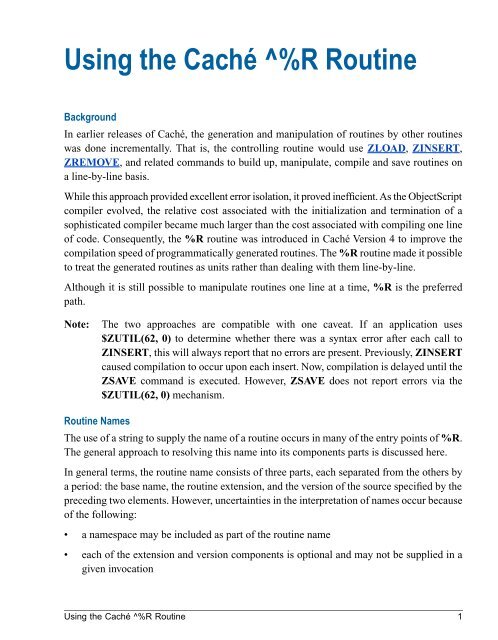Using the Caché ^%R Routine - InterSystems Documentation
Using the Caché ^%R Routine - InterSystems Documentation
Using the Caché ^%R Routine - InterSystems Documentation
You also want an ePaper? Increase the reach of your titles
YUMPU automatically turns print PDFs into web optimized ePapers that Google loves.
<strong>Using</strong> <strong>the</strong> <strong>Caché</strong> <strong>^%R</strong> <strong>Routine</strong><br />
Background<br />
In earlier releases of <strong>Caché</strong>, <strong>the</strong> generation and manipulation of routines by o<strong>the</strong>r routines<br />
was done incrementally. That is, <strong>the</strong> controlling routine would use ZLOAD, ZINSERT,<br />
ZREMOVE, and related commands to build up, manipulate, compile and save routines on<br />
a line-by-line basis.<br />
While this approach provided excellent error isolation, it proved inefficient. As <strong>the</strong> ObjectScript<br />
compiler evolved, <strong>the</strong> relative cost associated with <strong>the</strong> initialization and termination of a<br />
sophisticated compiler became much larger than <strong>the</strong> cost associated with compiling one line<br />
of code. Consequently, <strong>the</strong> %R routine was introduced in <strong>Caché</strong> Version 4 to improve <strong>the</strong><br />
compilation speed of programmatically generated routines. The %R routine made it possible<br />
to treat <strong>the</strong> generated routines as units ra<strong>the</strong>r than dealing with <strong>the</strong>m line-by-line.<br />
Although it is still possible to manipulate routines one line at a time, %R is <strong>the</strong> preferred<br />
path.<br />
Note:<br />
The two approaches are compatible with one caveat. If an application uses<br />
$ZUTIL(62, 0) to determine whe<strong>the</strong>r <strong>the</strong>re was a syntax error after each call to<br />
ZINSERT, this will always report that no errors are present. Previously, ZINSERT<br />
caused compilation to occur upon each insert. Now, compilation is delayed until <strong>the</strong><br />
ZSAVE command is executed. However, ZSAVE does not report errors via <strong>the</strong><br />
$ZUTIL(62, 0) mechanism.<br />
<strong>Routine</strong> Names<br />
The use of a string to supply <strong>the</strong> name of a routine occurs in many of <strong>the</strong> entry points of %R.<br />
The general approach to resolving this name into its components parts is discussed here.<br />
In general terms, <strong>the</strong> routine name consists of three parts, each separated from <strong>the</strong> o<strong>the</strong>rs by<br />
a period: <strong>the</strong> base name, <strong>the</strong> routine extension, and <strong>the</strong> version of <strong>the</strong> source specified by <strong>the</strong><br />
preceding two elements. However, uncertainties in <strong>the</strong> interpretation of names occur because<br />
of <strong>the</strong> following:<br />
• a namespace may be included as part of <strong>the</strong> routine name<br />
• each of <strong>the</strong> extension and version components is optional and may not be supplied in a<br />
given invocation<br />
<strong>Using</strong> <strong>the</strong> <strong>Caché</strong> <strong>^%R</strong> <strong>Routine</strong> 1

















